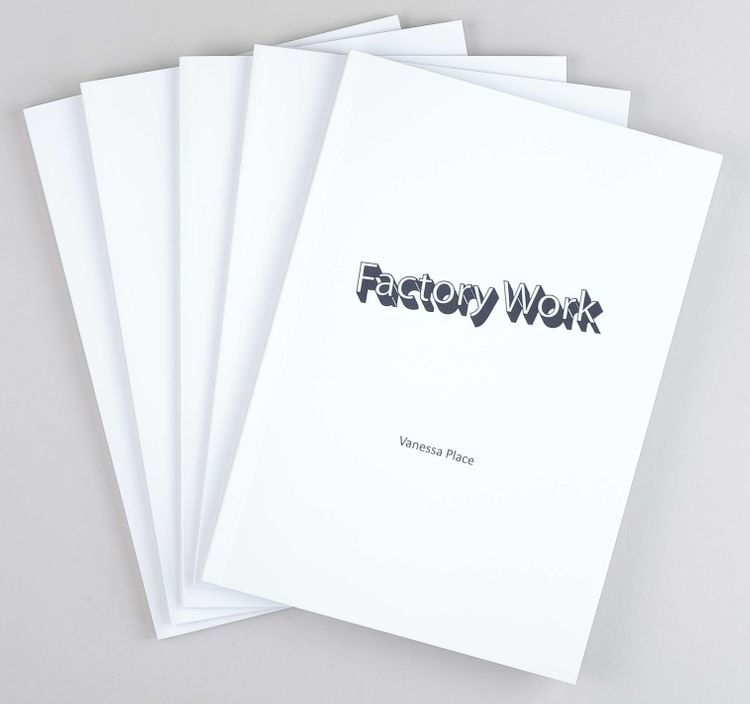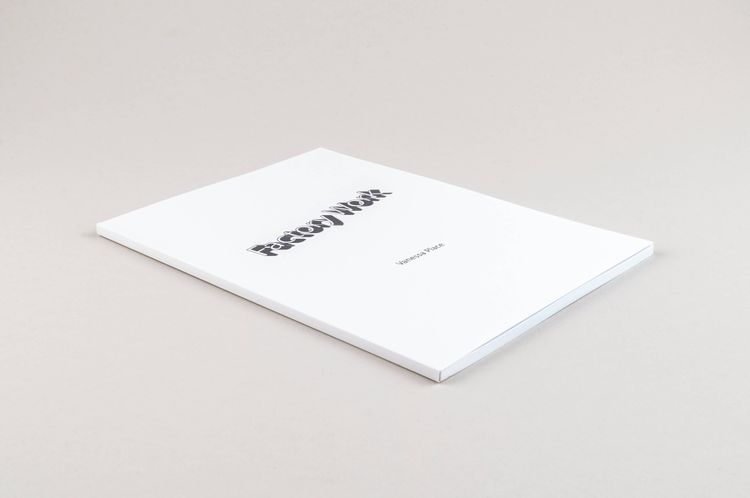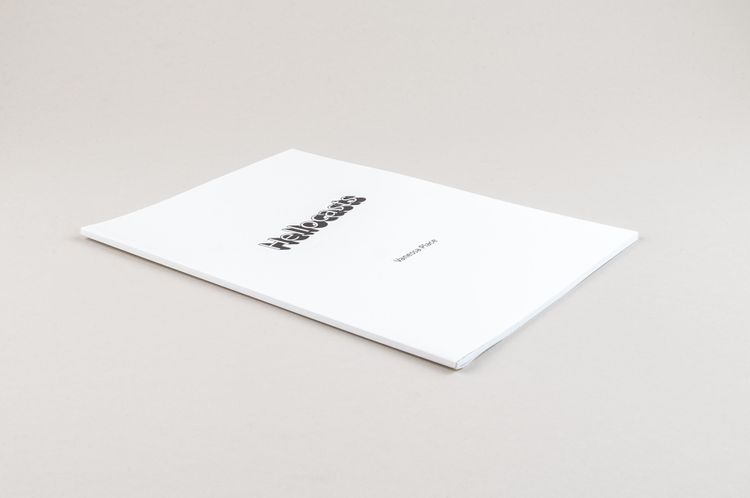Echoing Andy Warhol’s Factory paintings, Vanessa Place invited other authors to compose books for her Factory Series that she would sign herself as the author. Place even wanted to leave the printing preparation completely to her assistants, claiming in her open call: “it is my goal to have nothing to do with creation until after the fact.” In principle, writers were “allowed” to reveal the “true” authorship—Place was primarily focused on declaring her authorship on the printed artifact. The books, none of which have been written by Place, are advertised on Lulu as “a vivid portrayal of contemporary poetics” (blurb on Lulu).
Some volumes appear to be bound incorrectly, or the uploaded PDF files were not created carefully enough so that the title page is on the left instead of the right (see Hellocasts and Thank You For Reading), which affects the page layout throughout the book. The series so far includes thirteen volumes: Factory Work; Hellocasts; Poems for Oodpress; Thank you for Reading; The Polished You; Page Not Found; Revolution; Stoked; Black Square; Locus Solus; Only Yahweh; Poetry; and P.O.T.I.C.H.E. or Pathway to Decent Work for Women.
The series is edited by Chris Hershey-Van Horn (Ood Press).

This is the first publication in Vanessa Place’s Factory Series. It contains an excerpt from Andy Warhol’s Diaries (Warhol’s dictated memoirs, edited by Pat Hackett and posthumously published in 1989) from October 2 to December 31, 1980. Lost are all text markups (italics, boldface) and paragraphs.
The keywords chosen in the Lulu bookshop suggest that the “real” authorship on this work lies with Kenneth Goldsmith, a great connoisseur of Andy Warhol and editor of his interviews.

This is the second publication in Vanessa Place’s Factory Series. The keywords chosen in the Lulu bookshop suggest that the “real” authorship on this work lies with Divya Victor. The book is often listed as Hellocasts by Charles Reznikoff by Divya Victor by Vanessa Place, with the “author” disappearing behind a quotational practice.
Each double-page spread of the book presents a blank, lined notebook page on one side and a variation of the Hello Kitty character filled with handwritten text on the other. Two notebook pages meet in the middle of the book, then the same sequence of figure and notebook pages follows once again. The text in the outline of the global trademark turns out to be an excerpt from Charles Reznikoff ’s Holocaust (1975), which documents the testimony of survivors at the Holocaust tribunals.
Hellocasts also exists as drawings on a gallery wall and as performances by poet Divya Victor, both curated by Les Figues Press at Los Angeles Contemporary Exhibitions. In one performance, Divya Victor herself transcribes Reznikoff’s stanzas into Hello Kitty outlines projected onto the gallery wall; in another, visitors are invited to do the same while following the recording of Victor’s reading.

This is the third publication in Vanessa Place’s Factory Series. It in cludes twenty poems by experimental poets, ranging from classics such as William Carlos Williams, Gertrude Stein, and Aram Saroyan to contemporaries such as Christian Bök, Juliana Spahr, Harryette Mullen, and Eileen Myles. Each poem is set in a different font in 14 pt., ranging from Arial Rounded MT Bold, Times New Roman, Modern, and Century to Apple LiSung Light, Academy Engraved LET, and Euphemia UCAS Bold.
The keywords chosen in the Lulu bookshop suggest that the “real” authorship on this work lies with Steven Zultanski.

This is the thirteenth publication in Vanessa Place’s Factory Series. It contains want ads from dating portals for gay men, all of which include a thank you to the reader for reading. Personal information such as names, phone numbers, and email addresses are redacted.
The keywords chosen in the Lulu bookshop suggest that the “real” authorship on this work lies with Michael du Plessis. He confirms this in an interview with Janice Lee, who in turn reveals that she designed Only Yahweh from the series (Janice Lee, “An Interview”)
